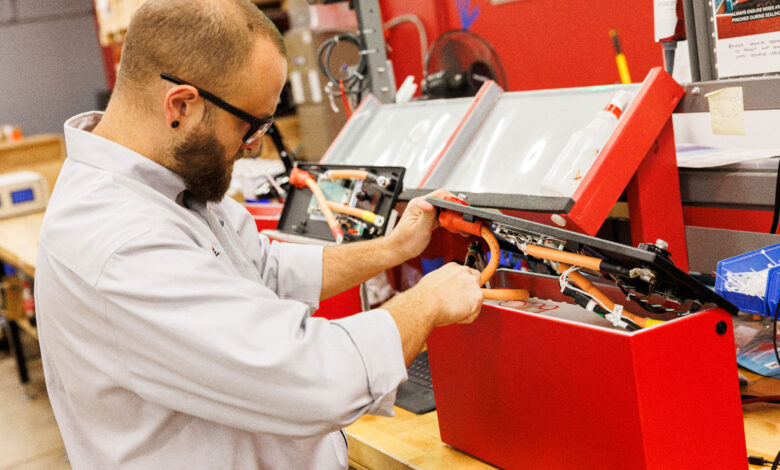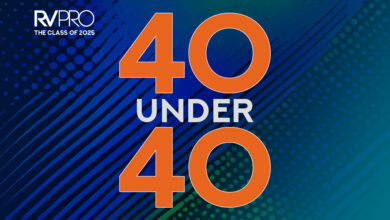How Regulations Are Reshaping RV Power Solutions & Design
Tightening emissions laws and evolving safety standards are driving innovation in lithium, solar and zero-emission technologies across the RV industry.

Editor’s Note: This is Part 2 of the four-part “Powering the Future: Insight on RV Energy Solutions.” For the main page with links to all four parts, click here.
How have state regulations & federal legislation impacted your company & the RV industry at large? Where do you see it heading in the future?

Eric Meadows, Lithionics, president: The RV industry is experiencing a significant transformation driven by evolving environmental regulations at both state and federal levels. Initiatives like California’s Advanced Clean Trucks (ACT) regulation mandate that manufacturers progressively increase the sales of zero-emission vehicles, aiming for substantial reductions in greenhouse gas emissions from medium- and heavy-duty trucks by 2035. In Canada, numerous municipalities have implemented idling control bylaws, typically restricting vehicle idling to three minutes in a 60-minute period. These measures are designed to reduce fuel consumption and lower emissions, contributing to improved air quality and environmental health. These regulatory trends underscore a broader shift away from reliance on combustion engines for house power, compelling the RV industry to adopt alternative power solutions. Lithium-ion energy storage systems have emerged as a pivotal technology in this transition, offering efficient, reliable and environmentally friendly power sources for RVs.

Mike Kurtz, REDARC Electronics, North American OEM sales leader: With a push to remove emissions in California and the desire to be off-grid, the ability to lean on lithium and solar will become an even larger opportunity in RV. Lithium has become more affordable, and technology has advanced to the point that there is no long a need for a generator or to have the vehicle plugged in to shore power. REDARC has the ability to educate the consumer on why they no longer need a generator and why lithium can be a better solution to keep you on the move and unplugged.
EcoFlow Technology Inc.: As more states adopt stricter emissions standards, there’s been a significant push toward cleaner, more sustainable energy solutions for vehicles and mobile living. This shift aligns with EcoFlow’s mission to deliver innovative, eco-friendly technologies that reduce reliance on fossil fuels and support off-grid independence. Incentives for renewable energy, such as solar tax credits, have accelerated consumer interest in portable, modular power solutions — especially among RV owners seeking to reduce their carbon footprint without sacrificing convenience. For example, because of the Inflation Reduction Act, as of now RV owners can now get 30% of the price of a solar system returned as a credit on their taxes. At the same time, stricter idling and generator use restrictions in campgrounds and public lands have made quiet, emission-free power alternatives not just desirable but necessary.

Andrew Stiebler, RVMP, GM of aftermarket sales & marketing: Yes, we’ve seen increasing pressure around California Air Resources Board (CARB) compliance and evolving state and federal regulations. We’ve used this as a catalyst to stay ahead of innovation — investing in EFI technology, advanced inverter systems and solar/hybrid-ready solutions. These shifts aren’t roadblocks for us, they’re opportunities to make our products more efficient, powerful and lightweight. Our EFI models, for example, deliver better fuel economy, increased output and notable weight savings.

Ellen Lee, BLUETTI POWER Inc., PR specialist: BLUETTI, like the entire RV industry, operates within a dynamic regulatory landscape shaped by both state and federal entities. These regulations have a multifaceted impact, influencing everything from product design and manufacturing to sales and end user experiences.
-
- Environmental Standards: Growing environmental regulations on emissions and waste management are pushing the RV industry towards cleaner practices, including more fuel-efficient/electric designs and better waste disposal. For BLUETTI, this aligns with our sustainable energy focus, though adapting manufacturing and sourcing can be challenging. The RV Industry Association (RVIA)’s focus on PFAS regulations and California’s ACT rule exemplify evolving environmental demands impacting the entire supply chain and future vehicle options.
- Safety Standards: Paramount safety regulations govern RV design and construction for occupant safety and fire prevention. BLUETTI rigorously tests and certifies our power solutions for safe RV integration.
- Consumer Protection: “Lemon laws” and warranty requirements necessitate transparency and strong after-sales service across the RV industry, reinforcing the need for manufacturers and dealers to stand by their products.
- Taxation and Incentives: Federal and state tax policies and incentives significantly influence RV demand and the adoption of technologies like electric RVs and solar power, benefiting companies like BLUETTI. RVIA actively addresses tax code issues impacting the industry.
- Franchise Laws: Developing state-specific RV franchise laws fosters a fairer relationship between manufacturers and dealers, acknowledging the RV industry’s unique characteristics.
Looking ahead, I anticipate several key trends in RV industry regulations:
-
- Increased Focus on Sustainability: The global push towards sustainability will likely lead to more stringent environmental regulations for RVs, including emissions standards, waste reduction mandates and potential incentives for electric or hybrid RVs and renewable energy integration. BLUETTI is well-positioned to contribute to this shift by providing the necessary power solutions. Our ongoing commitment to advancing battery technology is a testament to this, with our recent development of durable batteries boasting a lifespan of up to 17 years. This dedication to longevity directly supports our sustainability ethos by minimizing the need for frequent replacements and reducing waste.
- Emphasis on Energy Efficiency: Regulations might encourage or even mandate greater energy efficiency in RV appliances and systems, further driving the adoption of solutions like BLUETTI’s portable power stations and solar charging capabilities.
- Development of Infrastructure for Electric RVs: As electric RV technology advances, we’ll likely see regulations and investments aimed at developing the necessary charging infrastructure in campgrounds and along travel routes.
- Standardization and Interoperability: To enhance user experience and safety, there may be a push toward greater standardization and interoperability of components and systems within RVs, including power management.
- Continued Evolution of Consumer Protection: Regulations safeguarding consumer rights are likely to evolve, potentially addressing new aspects related to emerging technologies and online sales channels. State regulations and federal legislation are critical forces shaping the RV industry. While compliance can present challenges, these regulations also drive innovation, improve product quality and promote more sustainable practices.

Matthew Bondie, Revatek, director of sales: Tariffs by far are the largest issue for the RV industry. We have global supply chains built over decades to provide high quality components at low cost. If tariffs persist, they will disrupt production and consumer pricing negatively. Many specialized components cannot be built in the United States in the near term.

Rohini Raghunathan, Xponent Power, CEO and founder: Regulations are having two major impacts. The first impacts the use of gas generators, with some states applying stricter emissions standards on portable generators, culminating in a full sales ban by 2028. The second impacts the electrification of RVs, with manufacturers needing to increase the percentage of zero-emission vehicles (ZEVs) sold each year, including those used for motorhomes. Both of these situations will increase the need for clean solar power solutions.

Daniel Clarkson, Navico Group, VP & GM, Navico Connect: State regulations and federal legislation continue to impact our company and the RV industry at large. One notable change is the upcoming requirement for a permanently installed ground fault monitoring device that complies with UL2299. This device will be required to interrupt the ungrounded conductors if grounding is lost and additionally monitors and interrupts the grounding conductor if a potential is present on the grounding conductor. This presents a substantial opportunity for companies that can provide compliant solutions, enhancing safety and reliability for RV users. Additionally, CARB’s zero-emission generator requirements are accelerating the shift from internal combustion generator sets to quieter, fume-free power options. These regulations are driving innovation in the industry, pushing manufacturers to develop more sustainable and user-friendly power solutions. Looking ahead, we anticipate continued advancements in eco-friendly technologies and stricter safety standards, ultimately benefiting consumers with safer, more efficient and environmentally conscious RVs.
Find more answers on this topic on RV PRO’s website at rv-pro.com/tag/2025-powering-the-future/.


